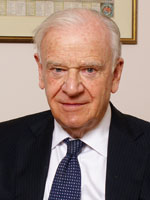Career
In 1962, Chown founded his tax advisory company, J F Chown & Company Limited, now Chown Dewhurst LLP. He has been a public policy adviser to Conservative Chancellors and Shadow Chancellors, [6] commenting on European tax harmonisation proposals and visiting Canada, Australia, New Zealand as an international adviser on their respective tax reforms. He was active in the Know How Fund, which provided market and taxation advice to transitional countries after the collapse of Communism, he continued to do advisory work in Russia, including a World Bank project of the development of capital markets and has worked, with Jackie Newbury, on projects in Mongolia and Thailand and has been on many City of London missions.
Chown is a co-founder of the Institute for Fiscal Studies [7] [8] and remains on the Committee of the International Tax Specialist Group, is active in the Political Economy Club, the Centre for the Study of Financial Innovation, the Official Monetary and Financial Institutions Forum, and several other Think Tanks.
He is Honorary Financial Adviser to the Royal Society of Musicians (and now an `Honorary Member’) and is still very active with the London Handel Society and other musical charities.
Writings
Chown wrote several books on tax policy, is the author of “A History of Monetary Unions” (Routledge 2003), [9] [10] and has contributed a chapter, “Lessons of Monetary History”, to the IEA study, “The Euro – the Beginning, the Middle .. and the End?” (April 2013) and reviewed for Central Banking, Harold James “Making the European Monetary Union” (February 2013).
Two articles and several other reviews in Central Banking deal more generally with the financial crisis. In November 2009, he wrote an article “Towards a New Banking System! In which he commented briefly on the problems arising from bad practices in the banking system. The editor invited him to follow up on this in “Conflicts of Interest and System Risk”, Central Banking, November 2010, discusses improper (and therefore unsustainable) profits made by banks, and their potential threat to financial stability, was a follow-up to an earlier article in November 2009, “Towards a New Banking System”. Several subsequent book reviews followed up on his point. He has contributed chapters to more than fifteen books on the topics of tax reform and monetary policy.
Chown, shocked by the way in which the banks were making very substantial hidden profits out of Initial Public Offerings by exploiting conflicts of interest, he made major campaigns and published “End to Underwriting: How the Coalition can avoid being Ripped Off!”, Centre for Policy Studies, August, 2011. When the EU proposed a Financial Transactions Tax (the Tobin Tax), Chown was invited to give evidence to the House of Lords Committee in late 2011 [11] and followed this with a publication “Time To Bin The Tobin Tax” Centre for Policy Studies, April 2012.
2019
- Review by John Chown. “Shadow Networks; financial disorder and the system that caused crisis.” Francisco Louca and Michael Ash. OUP, 2018, 416 pages. In Central Banking Vo. XXX, Number 1, September 2019. p 156-157.
2018
- Review by John Chown. “Edge of Chaos: why democracy is failing to deliver economic growth”. Dambisa Moyo. Little, Brown, 2018, 320 pages. In Central Banking, Vol. XXIX, Number 1, August 2018.
2017
- Review by John Chown. “Crash Bang Wallop: The Inside Story of London’s Big Bang and a Financial Revolution that Changed the World”, Sceptre, 2016, 352 pages. In Central Banking Vol. XXVIII, Number 1, August 2017.
- “What the Financial Crisis should have taught us about conflicts of interest and how to avoid them. John Chown, David Russell, QC. Trust & Trustees, January 2017, Oxford University Press. Trusts & Trustees (2017) 23 (2): 209-214. DOI:https://doi.org/10.1093/tandt/ttw221
- John Chown. “How to Sell the Family Silver – Lessons from the Royal Mail Sale”. The Pointmaker. Centre for Policy studies, May 2016.
- “The Tobin Tax Rears its Ugly Head, Again”, John Chown, The Pointmaker, Centre for Policy Studies, May 2013
This page is based on this
Wikipedia article Text is available under the
CC BY-SA 4.0 license; additional terms may apply.
Images, videos and audio are available under their respective licenses.
